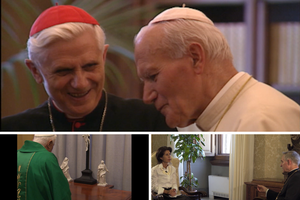Lessons From the Head of the Holy Family: A Consecration to St. Joseph for Men
BOOK PICK: ‘Custos’

CUSTOS
Total Consecration Through St. Joseph
By Devin Schadt
TAN Books, 2021
256 pages; $29.95
To order: EWTNRC.com
“Why another consecration to St. Joseph?” asks Devin Schadt, author of Custos: Total Consecration Through St. Joseph. He answers, “Joseph alone was the father and husband in the Holy Family. ... His heroic fulfillment of his vocation shows us how to live our fatherly vocation. Not only does he show men how to live their vocation, but he relates to us personally. He understands the plights and perils that befall the family man who lives in a hostile world.”
“In consecrating ourselves to St. Joseph in this manner,” Schadt adds, “God will draw us into the mysteries of Mary and Jesus, mysteries that this just guardian witnessed first-hand, mysteries that will inspire us to donate our lives and our fatherhood to Jesus, and ultimately to God the Father. In other words, St. Joseph will teach us how to love … and guide our families by teaching us the way he defended, loved, and provided for his family.”
This consecration “applies specifically to men who are or will be fathers.”
The title Custos further focuses on St. Joseph’s obvious roles (in Latin), “guardian, protector.”
Like many consecrations, Schadt, the executive director of the apostolate Fathers of St. Joseph and author of other books on St. Joseph, uses the 33-day formula. He arranges these in seven stages and adds 33 spiritual practices. Included is a pull-out “Seven Step Quickstart Guide.” Together, they become a road map.
For example, Stage 5 aims to “build your domestic church,” while among the 33 suggested spiritual practices are praying for each member of your family, making one daily hidden significant sacrifice, spending daily intentional time with your wife, having daily family prayer and evening time, celebrating feast days, blessing your wife and children daily, and having sacred images in your home. Wise explanations detail the reason and benefits of every practice ultimately meant to become a regular part of daily life.
“[St. Joseph] is the father who can mentor, guide, and lead the human father to be a father on earth like the Father in heaven,” informs the author.
Schadt focuses on St. Joseph’s life from his and Mary’s betrothal through losing and finding Jesus in the Temple in a way that connects to husbands and fathers today, underscoring why St. Joseph’s example is essential for every man — in fact, everyone — today. Along the way, the author brings out many interesting insights. For instance, Schadt notes that Joseph was a “hidden” king. Much of the author’s focus is based on Scripture or writings and teachings from the likes of St. John Paul II, which are explained in end notes.
Fatherhood as a vocation is underlined.
Like St. Joseph, a father is called to “the supernatural in the natural events, significance in the seemingly insignificant, the extraordinary in the apparently ordinary,” writes Schadt.
Each day’s short, enlightening chapter ends with a beautiful brief prayer to St. Joseph specifically tailored for the day’s reflection..
In many ways, Custos is geared for the man starting out on the spiritual road or spiritual journey to be a good husband and a good father. And yet men already on the spiritual path should equally find much to benefit from in these pages. One section begins, “Besides the gift of faith, the single most beneficial, inspiring endowment that parents can impart to their children is a harmonious, united marriage. Indeed, if the couple are united to Christ in the faith, more likely are they to impart faith in Christ to their child.”
Then there is the importance of living the Eucharistic sacrifices — in another words, going to church regularly and receiving the Eucharist, which the author ties into the husband-father’s self-sacrifice of making sure this happens for his family. Another is the husband-father’s responsibility to pray for each member of the family to emphasize that men need to perceive and establish their temporal houses as domestic churches.
In addition, a daily examination of conscience based on the beatitudes offers new methods and insights.
And love for Mother Mary is paramount.
“Many men, Christian men, neglect or reject devotion and reverence to our Blessed Mother,” writes the author. “How can the Lord accept a man who rejects his mother? For by rejecting her, they reject him, for the Lord is with her.”
This entire chapter of “The Thirty-Three Spiritual Practices” is exceptionally encouraging, guiding the husband-father to begin these practices and put them into action for a happier, holier family.
The premise of the book can be summed up in this excerpt: “It appears that in our age of spiritual famine, Our Lord has ordained that all mankind, particularly fathers, have recourse to St. Joseph, in union with Our Lady, entrusting themselves to his fatherly care. Those who do so will be given spiritual bread that nourishes them during times of spiritual famine. They will receive special graces, supernatural wisdom, and the virtue needed to raise families who become what his was — a holy family.”
St. Joseph, pray for us!
- Keywords:
- joseph pronechen
- st. joseph

















